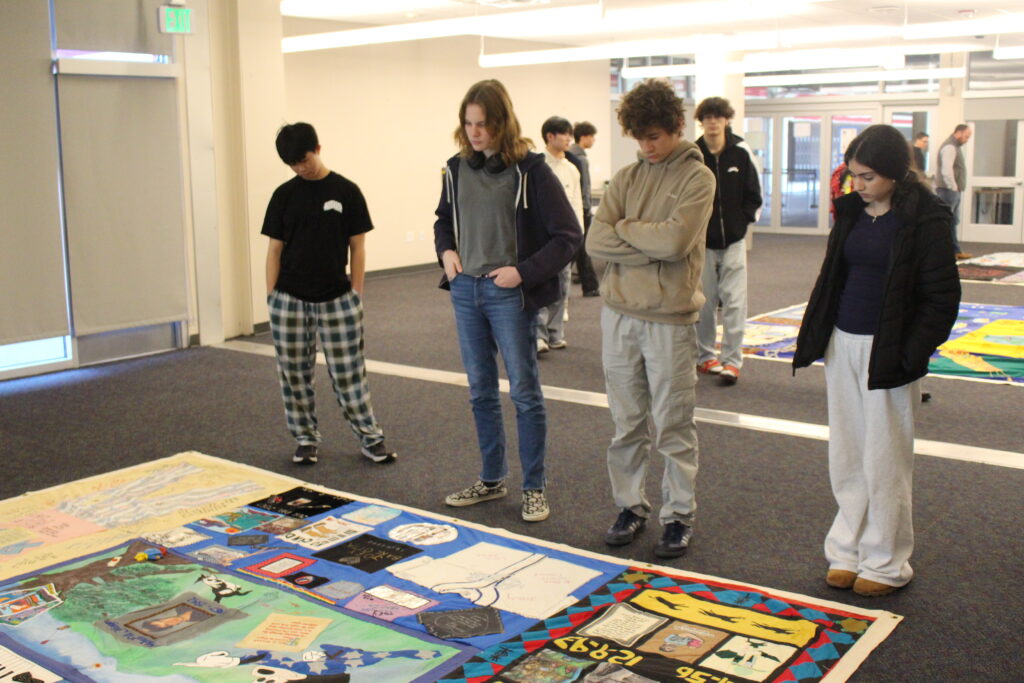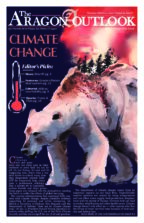
From Dec. 2-6, Aragon displayed the AIDS Memorial Quilt in the Multi-Purpose Room for students to view during their classes. The AIDS Quilt was created by the NAMES Project Foundations, which hosted the event in conjunction with Aragon’s Gender and Sexuality Alliance Club.
The 54-ton quilt, which has 50,000 panels and includes over 11,000 people, has traveled from San Francisco to Washington D.C., going to over 1,000 schools, places of worship and community centers to spread awareness about HIV/AIDS. There were three large sections of the quilt at Aragon, some panels displaying rows of names and others being dedicated to a single person.
“I felt really moved [as] these were very deep and personal messages,” said senior and GSA Secretary Matt Grabow. “It was touching that these family members would devote their time to pay homage and honor to the people.”
Some panels were particularly noteworthy for students.
“One of the panels shows this three-year-old, and it was a shock to some people because they thought AIDS could only be contracted by adults,” Grabow said. “There was [also] one panel that someone made while they contracted AIDS, and they had died after, [which] just really shows the impact of AIDS back then; it was a very dark time for a lot of people.”
Despite misconceptions, HIV/AIDS also affects children, with an annual death rate of 76,000 children. Aarron Phillip Nelson was one of these children — his panel is adorned with toys and baby socks. He was born Nov. 7, 1988, and died three days before his third birthday on Nov. 4, 1991.
Duane Kearns Puryear was born on Dec. 20, 1964, and was diagnosed at 22 years old on Sep. 7, 1987. His panel reads, “My name is Duane Kearns Puryear. I was born on December 20, 1964. I was diagnosed with AIDS on September 7, 1987 at 4:45 PM. Sometimes, it makes me very sad. I made this panel myself. If you are reading it, I am dead….”
He died on Oct. 8, 1991, at the age of 26. He would have turned 60 this year.
The AIDS Memorial Quilt serves a variety of purposes ranging from commemoration to a call for better sexual education.
“The AIDS Quilt is a reminder of a generation of loss and a pandemic that impacted the Bay Area Community greatly,” said GSA adviser Vincent Bravo. “It also is a reminder of public health care [and] a reminder of the human nature of coming together to remember [the victims].”
The HIV/AIDS epidemic has been ongoing since the 1980s and has affected millions of people, with over a million Americans currently infected, and 13% not knowing they have HIV. Every year, 8,000 people die from these illnesses.
“Growing up in the San Francisco Bay Area in the ‘80s and ‘90s, HIV and AIDS was really a part of my life,” Bravo said. “I lost a cousin to AIDS. I had adult friends who were HIV positive, and I watched [one] die. I watched communities turn their back, I watched my family turn their back on people. But then I also watched my family and community accepting people and really taking care of people.”
Although HIV infections are still prevalent, they have fallen by 39% globally and continue on a declining trend, partly due to the availability of treatments and preventative measures, such as STD testing.
“If you’re going to engage in sex, both you and your partner should go and get tested [for STDs],” said Health teacher Barbara Beaumont. “Be able to have open communication with your partner to talk about it … and be able to see the results for your partner’s test.”
Planned Parenthood and the San Mateo Edison Clinic both offer STD testing services, condoms and pre-exposure prophylaxis, which reduces the chance of an HIV infection if someone is particularly at risk. At Planned Parenthood, confidential HIV tests are available, providing results in 10-40 minutes.



